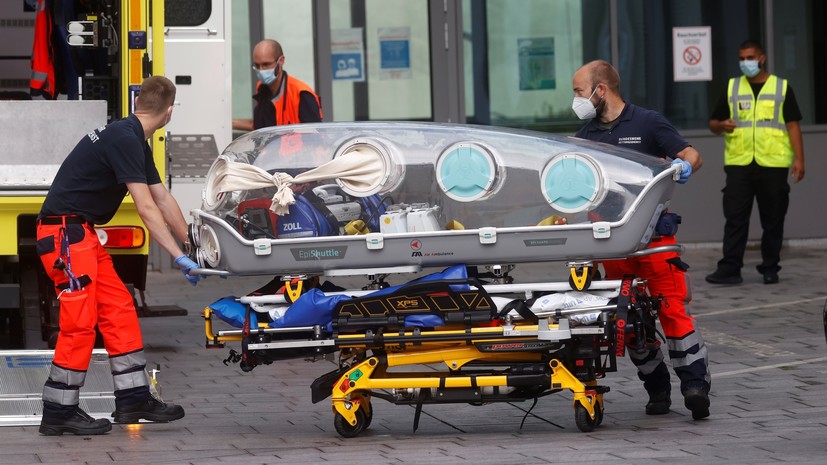The Kremlin saw no reason for new sanctions against Russia because of the situation with Alexei Navalny.
This was stated by the press secretary of the President of the Russian Federation Dmitry Peskov.
“We do not understand what could be the reason for any sanctions.
On the whole, we do not accept the sanctions conversation and the sanctions language, we consider it absolutely unacceptable.
But in this case, we do not understand the reasons for discussing the topic of any sanctions, ”Peskov said.
He said this when answering a question whether the Kremlin expects sanctions from Germany or other European countries.
He also commented on calls in the Bundestag to stop the implementation of the Nord Stream 2 project due to the situation with Navalny.
“Rather, these are (appeals -
RT
) some kind of emotional statements that are not based on concrete facts, on factual facts ... Nord Stream 2 is a commercial project that is in the interests of the two countries, in the interests of the energy security of the entire European continent ", - answered Peskov.
Vice-Chairman of the German Bundestag Wolfgang Kubiki, in turn, also appreciated the possibility of stopping the Nord Stream 2 project.
"In the light of the currently available data, an immediate termination of construction would be inappropriate," he told RT.
According to him, it is necessary to wait for the development of the situation with Alexei Navalny.
As Kubiki noted, if Moscow does not demonstrate its readiness to conduct an investigation, then further sanctions will need to be considered.
"Since this project is not yet completed, you can always stop its implementation," he added.
Let us remind you that on August 20, an S7 plane made an emergency landing at the Omsk airport.
The reason for this was a sharp deterioration in the state of health of Alexei Navalny, who flew this flight.
The man was urgently taken to a local hospital, he was unconscious.
Relatives insisted on the transfer of Navalny to the German clinic "Charite".
When the doctors of the Omsk hospital found the patient's condition stable, he was sent to Germany.
Subsequently, the official representative of the German government, Steffen Seibert, said that Alexei Navalny was allegedly poisoned with a nerve agent from the Novichok group.
The toxicological study was carried out by a special laboratory of the German Armed Forces.
Later, German Chancellor Angela Merkel spoke on the same topic.
In her opinion, Navalny became a "victim of a crime."
“A specialized laboratory of the Bundeswehr came to a clear and unequivocal conclusion that Alexei Navalny was a victim of poisoning with a military nerve agent from the Novichok group,” she said at a press conference on September 2.
The press secretary of the Russian President Dmitry Peskov, after the statements of the German side, recalled that before being taken to Berlin, Navalny underwent a complex of analyzes in accordance with international standards, and they did not reveal any toxic substances.
The Russian Foreign Ministry published a message in which it called on partners to fully cooperate and exchange information within the framework of legal mechanisms.
"If the task is to substantiate some pre-prepared" response measures ", which have already been announced earlier, then it becomes clear why megaphone diplomacy, the substitution of an information campaign for normal cooperation, public appeals to the EU and NATO, mention of the OPCW are used" , - said in the message.
As noted in the Foreign Ministry, Russia insists on an investigation with the participation of medical organizations.
"If the real goal is still a thorough investigation by law enforcement agencies with the participation of medical organizations, which we strongly insist on, then we call on our partners to fully cooperate and exchange information using existing bilateral legal mechanisms," Russian diplomats said.
The Organization for the Prohibition of Chemical Weapons (OPCW) has expressed concern over reports of the poisoning of Alexei Navalny.
This was stated by its CEO Fernando Arias.
According to him, the OPCW continues to monitor the situation with Navalny and is ready to interact with any participating States on this topic.
"The OPCW continues to monitor the situation and is ready to help any participating State that may request assistance," Arias quotes TASS.
Belarus, in turn, announced the interception of the conversation, confirming that the allegations of the poisoning of Alexei Navalny are falsifications.
This was announced on Thursday by Belarusian leader Alexander Lukashenko during a meeting with Russian Prime Minister Mikhail Mishustin.
“So I must tell you that yesterday or the day before yesterday, I don’t remember exactly, before Merkel’s speech we intercepted the conversation.
We understand that Warsaw is talking with Berlin.
Two subscribers are in touch.
Our electronic military intelligence intercepted ... And we intercepted an interesting conversation, which (I will give it to you to read, we will prepare and send it to the FSB) clearly indicates that this is falsification.
There was no poisoning of Navalny, "Lukashenko told Mishustin.
Against the background of these events, the head of the Foreign Intelligence Service, Sergei Naryshkin, did not rule out that the situation with the alleged poisoning of Alexei Navalny was rigged by the Western special services.
“This cannot be ruled out,” he told reporters.

